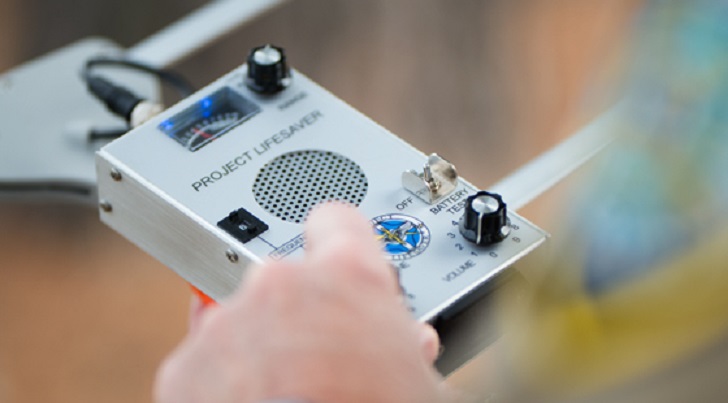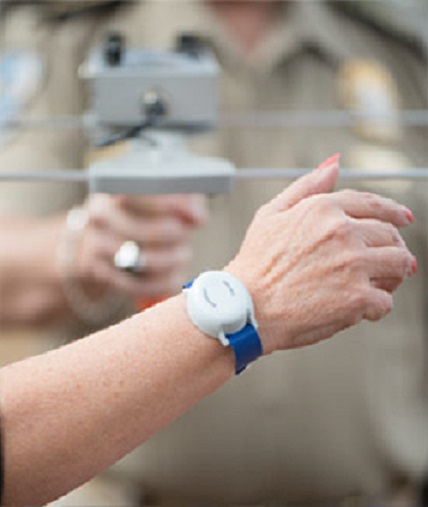
By Tim Kelly
Caregivers and loved ones of the elderly and autistic individuals have enough to worry about.
Thanks to a free program available through the Cape May County Sheriff’s Office, the fear of the person wandering off and becoming lost doesn’t need to be one of them.
Project Lifesaver employs a system that uses a small radio transmitter worn on the client’s wrist or ankle and a receiver operated by the Sheriff’s Officers to quickly locate clients suffering from Alzeimer’s Disease or dementia, or those with autism who may be at risk to wander off.
“This is not new, or cutting edge technology,” said Sheriff’s Officer Dustin Phillips, coordinator of the program, “it’s just a very effective technology.”
Project Lifeline has its own radio frequency, and each user’s transmitter has a unique frequency as well. This enables trained operators to determine which individual is assigned to each transmission and the location where it is being sent from.
The majority of the Sheriff’s Officers are trained in the use of the technology and eventually all will be, Phillips added.

Sheriff’s Officer Dustin Phillips, a member of the K-9 Unit, with his four-legged partner Frankie
Nationally, the program has resulted in the rescue or 3,513 people since it began in 1999, according to the Project Lifesaver International website.
In the county, Phillips said the program currently serves 32 individuals. Four people were located in the county in 2018, the last figures available. Even more impressive, since the project was implemented locally in 2005, the transmitter and receiver have a 100 percent success rate.
“Frequently (certain people with autism) find sensory satisfaction when they are in or near water. Obviously, that is not a good situation when you are talking about a person who is lost and who has special needs.”
The transmitter has a range of about a mile, he said, meaning that the Sheriff’s Department officers have the ability to comb an area with a two-mile radius in approximately five minutes.
The program is specifically designed for people whose challenges make it unlikely they would go unnoticed long enough for them to wander outside the transmitter range. People with milder challenges, who do not have round-the-clock caregivers may not be a good fit.
“It is a great tool to help us find people and to provide some peace of mind to the caregivers,” he said.
Additionally, clients using the system may do so when they travel outside the area. A caregiver simply informs the local authorities the person is in town, and their information will be fed into that area’s database and monitoring capabilities.
The only drawback to the program, he said, is the fact that more people do not take advantage of it.

Cape May County Sheriff Bob Nolan
“The Sheriff believes the technology is out there, and people should use it. Even though this has been an extremely successful program, it would be even better if more people were aware of it.”
Unlike many other location technologies such as GPS, the Project Lifesaver is not dependent on satellites or Wi-Fi connections, Phillips said.
“It’s a simple transmission of radio waves, so it works in power outages. Sometimes the satellite will go out. Or you might be in a dead spot where the satellite won’t work. That will not affect this system,” he said.
According to Phillips, the technology does not come cheap. A receiver costs more than $1,000 and each wearable transmitter has a $275 price tag. However, partnerships with groups such as Faces of Autism obtained grants and other sources of funds used to purchase the hardware and train personnel.
The program is not simply a location technology. Project Lifesaver also provides police-community partnership training and education and awareness initiatives.
“It is a great opportunity for us to help people on one of the worst days of their life,” said Phillips, a four-year Sheriff’s Department veteran and a resident of Cape May Courthouse.

A Project Lifesaver transmitter, which can be worn on the wrist or the ankle. The device sends out a radio signal to allow the wearer to be tracked by Sheriff’s Officers. (Photo courtesy of Operation Lifesaver),
At present, there are openings for 12 more individuals to enroll in the program, he said.
To apply for Project Lifesaver, visit
www.projectlifesaver.org or call the Cape May County Sheriff’s Office at 609-463-6420.
 By Tim Kelly
Caregivers and loved ones of the elderly and autistic individuals have enough to worry about.
Thanks to a free program available through the Cape May County Sheriff’s Office, the fear of the person wandering off and becoming lost doesn’t need to be one of them.
Project Lifesaver employs a system that uses a small radio transmitter worn on the client’s wrist or ankle and a receiver operated by the Sheriff’s Officers to quickly locate clients suffering from Alzeimer’s Disease or dementia, or those with autism who may be at risk to wander off.
“This is not new, or cutting edge technology,” said Sheriff’s Officer Dustin Phillips, coordinator of the program, “it’s just a very effective technology.”
Project Lifeline has its own radio frequency, and each user’s transmitter has a unique frequency as well. This enables trained operators to determine which individual is assigned to each transmission and the location where it is being sent from.
The majority of the Sheriff’s Officers are trained in the use of the technology and eventually all will be, Phillips added.
By Tim Kelly
Caregivers and loved ones of the elderly and autistic individuals have enough to worry about.
Thanks to a free program available through the Cape May County Sheriff’s Office, the fear of the person wandering off and becoming lost doesn’t need to be one of them.
Project Lifesaver employs a system that uses a small radio transmitter worn on the client’s wrist or ankle and a receiver operated by the Sheriff’s Officers to quickly locate clients suffering from Alzeimer’s Disease or dementia, or those with autism who may be at risk to wander off.
“This is not new, or cutting edge technology,” said Sheriff’s Officer Dustin Phillips, coordinator of the program, “it’s just a very effective technology.”
Project Lifeline has its own radio frequency, and each user’s transmitter has a unique frequency as well. This enables trained operators to determine which individual is assigned to each transmission and the location where it is being sent from.
The majority of the Sheriff’s Officers are trained in the use of the technology and eventually all will be, Phillips added.
 Sheriff’s Officer Dustin Phillips, a member of the K-9 Unit, with his four-legged partner Frankie
Nationally, the program has resulted in the rescue or 3,513 people since it began in 1999, according to the Project Lifesaver International website.
In the county, Phillips said the program currently serves 32 individuals. Four people were located in the county in 2018, the last figures available. Even more impressive, since the project was implemented locally in 2005, the transmitter and receiver have a 100 percent success rate.
“Frequently (certain people with autism) find sensory satisfaction when they are in or near water. Obviously, that is not a good situation when you are talking about a person who is lost and who has special needs.”
The transmitter has a range of about a mile, he said, meaning that the Sheriff’s Department officers have the ability to comb an area with a two-mile radius in approximately five minutes.
The program is specifically designed for people whose challenges make it unlikely they would go unnoticed long enough for them to wander outside the transmitter range. People with milder challenges, who do not have round-the-clock caregivers may not be a good fit.
“It is a great tool to help us find people and to provide some peace of mind to the caregivers,” he said.
Additionally, clients using the system may do so when they travel outside the area. A caregiver simply informs the local authorities the person is in town, and their information will be fed into that area’s database and monitoring capabilities.
The only drawback to the program, he said, is the fact that more people do not take advantage of it.
Sheriff’s Officer Dustin Phillips, a member of the K-9 Unit, with his four-legged partner Frankie
Nationally, the program has resulted in the rescue or 3,513 people since it began in 1999, according to the Project Lifesaver International website.
In the county, Phillips said the program currently serves 32 individuals. Four people were located in the county in 2018, the last figures available. Even more impressive, since the project was implemented locally in 2005, the transmitter and receiver have a 100 percent success rate.
“Frequently (certain people with autism) find sensory satisfaction when they are in or near water. Obviously, that is not a good situation when you are talking about a person who is lost and who has special needs.”
The transmitter has a range of about a mile, he said, meaning that the Sheriff’s Department officers have the ability to comb an area with a two-mile radius in approximately five minutes.
The program is specifically designed for people whose challenges make it unlikely they would go unnoticed long enough for them to wander outside the transmitter range. People with milder challenges, who do not have round-the-clock caregivers may not be a good fit.
“It is a great tool to help us find people and to provide some peace of mind to the caregivers,” he said.
Additionally, clients using the system may do so when they travel outside the area. A caregiver simply informs the local authorities the person is in town, and their information will be fed into that area’s database and monitoring capabilities.
The only drawback to the program, he said, is the fact that more people do not take advantage of it.

 A Project Lifesaver transmitter, which can be worn on the wrist or the ankle. The device sends out a radio signal to allow the wearer to be tracked by Sheriff’s Officers. (Photo courtesy of Operation Lifesaver),
At present, there are openings for 12 more individuals to enroll in the program, he said.
To apply for Project Lifesaver, visit www.projectlifesaver.org or call the Cape May County Sheriff’s Office at 609-463-6420.
A Project Lifesaver transmitter, which can be worn on the wrist or the ankle. The device sends out a radio signal to allow the wearer to be tracked by Sheriff’s Officers. (Photo courtesy of Operation Lifesaver),
At present, there are openings for 12 more individuals to enroll in the program, he said.
To apply for Project Lifesaver, visit www.projectlifesaver.org or call the Cape May County Sheriff’s Office at 609-463-6420.